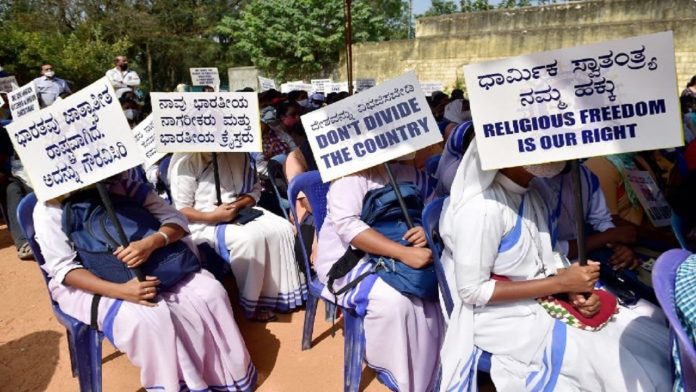“In India, it is religion that forms the very core of the national heart. It is the backbone, the bed-rock, the foundation upon which the national edifice has been built. Politics, power, and even intellect form a secondary consideration here. Religion, therefore, is the one consideration in India.”
—Swami Vivekananda
In a significant political move, the Karnataka government recently announced the repeal of the stringent law regulating forcible religious conversion in the state. This was introduced during the previous BJP regime.
The Congress government led by Siddaramaiah decided to scrap the Karnataka Protection of Right to Freedom of Religion Act, 2022— popularly known as the anti-conversion law—in an attempt to fulfill its poll promise of reviewing, and if required, scrapping all “unjust and anti-people” laws enacted by the BJP government. The decision to repeal the changes was taken in a cabinet meeting.
The state’s Law and Parliamentary Affairs Minister HK Patil said that the government will bring in a Bill during the upcoming assembly session to repeal the amendments to the anti-conversion law in order to ensure that the spirit of the Constitution is fully implemented.
The Constitution guarantees to all persons the right to profess, practise and propagate any religion of their choice subject to public order, morality and health. However, in Rev. Stainislaus vs State of Madhya Pradesh and Ors. (1977), the top court clarified that the right to freedom of religion as enshrined under Article 25 of the Constitution does not grant the right to forcibly convert other person to one’s own religion, but to transmit or spread one’s religion by an exposition of its tenets.
Noting the rising instances of religious conversions in Karnataka, the anti-conversion law, namely the Karnataka Protection of Right to Freedom of Religion Act, 2022, was enacted by the then ruling BJP government in the state. The Act came into effect in 2022 despite stiff opposition from the Opposition and different sections of society. The Act provided for protection of right to freedom of religion and prohibition of unlawful conversion from one religion to another by misrepresentation, force, undue influence, coercion, allurement or by any fraudulent means or by promise of marriage. It prescribed imprisonment for a term of three years extendable up to five years and a fine of Rs 25,000 for forced conversion. Converting a minor or a person of unsound mind or a woman or a person belonging to the Scheduled Castes or Scheduled Tribes is punishable with imprisonment for three years extendable up to ten years and a fine of Rs 50,000, while mass conversion is punishable with imprisonment for three years extendable up to ten years and a fine of Rs 1,00,000.
According to the Act, a person who desires to willfully convert his religion must give a declaration at least 30 days in advance to the district magistrate (DM) or the additional district magistrate. A similar declaration has to be given by the religious converter who performs the conversion ceremony. The DM, after receiving information, shall notify the proposed religious conversion on his notice board and in the office of the tehsildar calling for objections. Upon receiving any objections within 30 days, the DM will make an inquiry on the intention, purpose and cause of the proposed conversion; and if the conversion is found to be unlawful, he shall cause the concerned police authorities to initiate criminal action.
The issue of religious conversion has always been a widely debated topic in our country. Though there is no central legislation to regulate religious conversions, there are state-level statutes to restrict religious conversions carried out by force, coercion, allurement or fraudulent means.
Laws restricting religious conversions were originally introduced by Hindu princely states during the Colonial period, particularly during the latter half of the 1930s and 1940s, in an attempt to preserve Hindu religious identity in the face of British missionaries. Some of these princely states include Bikaner, Jodhpur, Udaipur, Raigarh and Kalahandi.
Post-Independence, several anti-conversion bills were introduced in the Parliament, but none got enforced. The first Bill, the Indian Conversion (Regulation and Registration) Bill, was introduced in 1954, which sought licensing of missionaries and the registration of conversion with government officials.
This was followed by the Backward Communities Bill which was introduced in 1960 and aimed at checking conversion of Hindus to “non-Indian religions”. Christianity, Islam, Zoroastrianism and Judaism were identified as non-Indian religions in the Bill.
The next Bill, the Freedom of Religion Bill, was introduced in 1979. It aimed at curbing inter-religious conversions. None of these bills could be passed by the Parliament due to lack of political support.
Finally, in 2015, the Union law ministry said that a law against forced and fraudulent religious conversions could not be enacted at the national level. It further said that as these matters come under the state subjects, they were free to enact such laws.
Over the years, several states have enacted legislation to prohibit forced religious conversions. Among the first were the Orissa Freedom of Religion Act, 1967, and the Madhya Pradesh Dharma Swatantrya Adhiniyam, 1968. Other states where such legislation is in force includes Arunachal Pradesh, Chhattisgarh, Gujarat, Himachal Pradesh, Jharkhand and Uttarakhand.
Religion in politics has always been a topic of contention. But what needs attention in today’s time is to what extent a state can intervene between citizens and their religious choice.
—By Banshika Garg and India Legal Bureau


